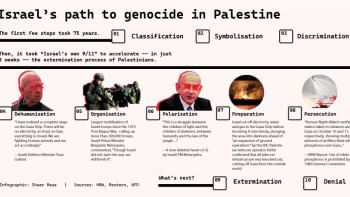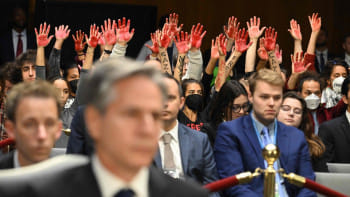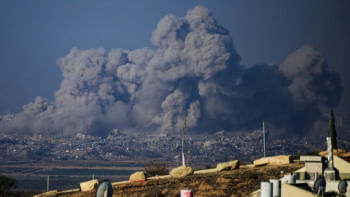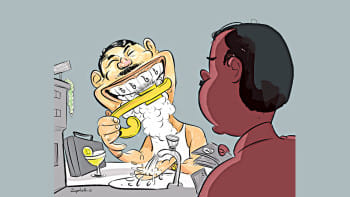A civility test between Israelis and Palestinians

Beirut-based journalist and writer Soraya Antonius was born in Jerusalem when it was the capital of Palestine. She has written in both English and French and thus helped transmit information about the Palestine question, especially to the Western audience. In a journal article titled "Prisoners for Palestine: A List of Women Political Prisoners," she provides a heart-wrenching account of the inhumane treatment of Palestinian detainees who are captured by Israeli forces through mass arrests and so-called administrative detention (without trial).
The thrust of Soraya Antonius' decades-old essay is this: the dehumanising methods of physical and psychological humiliation to which Palestinian prisoners are subjected are driven by an intention to reduce them to "animals."
Among the stories of the (mis)treatment of Palestinian female prisoners that Soraya Antonius includes is the following account by a female Palestinian detainee: "In March 1979 we were blindfolded and handcuffed and loaded onto a bus. We thought we must be going to another prison; we didn't know that we were to be released. Up till the very last minute the Israelis behaved meanly. On the tarmac of the airport in Israel – I don't know which airport as we were still blindfolded – they told us that if we wanted to go to the bathroom to do it right there, in the open. I suppose they wanted to photograph us and show that Palestinians are animals, without shame. And in the plane, in addition to keeping us blindfolded and handcuffed, they tied our feet as well… We were not allowed to talk and they knocked us about in the plane. When it landed, as I waited to go out, I received such a blow from behind that I thought my back was broken. Meanness, right up to the last."
Fast forward more than 40 years, Israeli cruelty—compounded by meanness—keeps going on. Through oppression and dehumanisation, the Israeli government has continued to try to damage the Palestinian psyche and self-respect. In November, when a number of Palestinians were released from Israeli imprisonment as part of a deal between the Israeli government and Hamas, Lucy Williamson of BBC interviewed six of them. She recounts their ordeals in a December 1 report titled "Released Palestinians allege abuse in Israeli jails." According to Lucy Williamson, "They [Palestinian prisoners] have described being hit with sticks, having muzzled dogs set on them, and their clothes, food and blankets taken away. One female prisoner has said she was threatened with rape, and that guards twice tear-gassed inmates inside the cells."
Despite all the inhumane treatment that Israelis mete out to the Palestinians both in prisons and outside, the dominant Israeli narrative seeks to present the Palestinians as savage, violent terrorists, suicide bombers, and animals. This resonates with the colonial racial categorisation of the colonised.
The BBC quotes 18-year-old Mohammed Nazzal, who said, "They arranged us so that the elderly prisoners were put in the back and the young in front. They took me and started beating me. I was trying to protect my head, and they were trying to break my legs and my hands… In the beginning, I was in a lot of pain. Then after a while, I knew that they were broken, so I stopped using them. I only used them when I went to the toilet… They came in with their dogs. They let the dogs attack us and then they started beating us. They took out mattresses, our clothes, our pillows, and they threw our food on the floor… The dog attacking me wore a muzzle with very sharp edges – his muzzle and claws left marks all over my body."
Despite all the inhumane treatment that Israelis mete out to the Palestinians both in prisons and outside, the dominant Israeli narrative seeks to present the Palestinians as savage, violent terrorists, suicide bombers, and animals. This resonates with the colonial racial categorisation of the colonised.
On October 9, Israeli Defense Minister Yoav Gallant called the Palestinians "human animals." This led a Geneva-based UN committee to voice concern that such language use could "incite genocidal actions" against Palestinians. The recent flare-up of Israeli violence against Palestinians has left us in shock and disbelief, as we have seen outcomes of "genocidal actions" in Gaza and the West Bank.
Since October 7, the Israeli government has descended on Gaza with madness and a bloodthirsty carnage—all with the complicity of Western governments. It has so far killed nearly 16,000 men, women and children who had nothing to do with Hamas' attacks on Israel.
Still, the Israelis are deemed civilised and the Palestinians savages! As opposed to the negative and pejorative assumptions about Palestinians, Israelis are routinely described as civilised and democratic.
Given the Manichean, dualistic division between Israelis and Palestinians in the media, I propose a touchstone test for determining the civility or otherwise of the Israeli and the Palestinian authorities. That is, to compare between how, for decades, tens of thousands of Palestinian detainees have been treated in Israeli dungeons and detention centres, and how Israeli captives have been treated by Palestinian groups like Hamas.
I welcome all—especially fair-minded Western scholars and journalists—to do this civility test. They may wish to talk to the Israeli captives who have returned from the custody of Hamas in different phases.
We have seen in the media that an Israeli elderly woman named Yocheved Lifshitz (85) said "shalom" (peace) to her Hamas captors when being released from captivity. The Guardian regarded Lifshitz's statement regarding her experience in Hamas' care as "a rare description of humanity in a savage conflict," which Israeli commentators described as "a public relations win for Hamas." Journalist Riley Stuart of the Australian Broadcasting Corporation (ABC) began a December 3 report with these words, "Two Israeli hostages smiling and waving goodbye to their captors from inside the safety of a Red Cross vehicle, preparing for their ride to freedom."
On a final note, Australian journalist Tony Clifton and the late French war photojournalist Catherine Leroy covered the 1982 Israeli invasion of Lebanon. They had at their disposal pictures and footage of Israeli brutalities in Lebanon, which Western media outlets would not want to print. Later, Clifton and Leroy produced the 1983 book God Cried to tell the world what atrocities were going on in Lebanon in 1982.
I invite journalists who cover the Israel-Palestine conflict—but are beholden to the preferences of the media owners or to the pressures of the advertisers—to follow the example of Clifton and Leroy.
Md Mahmudul Hasan, PhD is professor of English at International Islamic University Malaysia.
Views expressed in this article are the author's own.
Follow The Daily Star Opinion on Facebook for the latest opinions, commentaries and analyses by experts and professionals. To contribute your article or letter to The Daily Star Opinion, see our guidelines for submission.

 For all latest news, follow The Daily Star's Google News channel.
For all latest news, follow The Daily Star's Google News channel. 











Comments